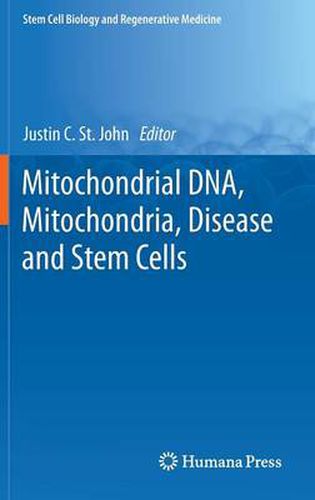Readings Newsletter
Become a Readings Member to make your shopping experience even easier.
Sign in or sign up for free!
You’re not far away from qualifying for FREE standard shipping within Australia
You’ve qualified for FREE standard shipping within Australia
The cart is loading…






This title is printed to order. This book may have been self-published. If so, we cannot guarantee the quality of the content. In the main most books will have gone through the editing process however some may not. We therefore suggest that you be aware of this before ordering this book. If in doubt check either the author or publisher’s details as we are unable to accept any returns unless they are faulty. Please contact us if you have any questions.
This volume investigates how the mitochondrial genome is transmitted, segregated, and inherited. It starts by describing mtDNA mutations and deletions and how these impact on the offspring’s well-being. It progresses to discuss how mutations to the mtDNA-nuclear-encoded transcription, replication and translational factors lead to mtDNA-depletion syndromes and how these affect cellular function and lead to the pathology of human mitochondrial disease. It also highlights the importance of the mitochondrial assembly factors and how mutations to these can lead to mitochondrial disease. The reader is then introduced to how mtDNA is transmitted through the oocyte and how stem cells can be used to study mitochondrial biogenesis and mtDNA replication and transcription in undifferentiated pluripotent and differentiating cells and how mitochondria adapt during this process. It then discusses how diseases like cancer are initiated and regulated by mutations to mitochondrial DNA and dysfunctional mitochondria. Finally, it draws on assisted reproductive technologies to discuss how some of these approaches might be adapted to prevent the transmission of mutant and deleted mtDNA from one generation to the next.
$9.00 standard shipping within Australia
FREE standard shipping within Australia for orders over $100.00
Express & International shipping calculated at checkout
This title is printed to order. This book may have been self-published. If so, we cannot guarantee the quality of the content. In the main most books will have gone through the editing process however some may not. We therefore suggest that you be aware of this before ordering this book. If in doubt check either the author or publisher’s details as we are unable to accept any returns unless they are faulty. Please contact us if you have any questions.
This volume investigates how the mitochondrial genome is transmitted, segregated, and inherited. It starts by describing mtDNA mutations and deletions and how these impact on the offspring’s well-being. It progresses to discuss how mutations to the mtDNA-nuclear-encoded transcription, replication and translational factors lead to mtDNA-depletion syndromes and how these affect cellular function and lead to the pathology of human mitochondrial disease. It also highlights the importance of the mitochondrial assembly factors and how mutations to these can lead to mitochondrial disease. The reader is then introduced to how mtDNA is transmitted through the oocyte and how stem cells can be used to study mitochondrial biogenesis and mtDNA replication and transcription in undifferentiated pluripotent and differentiating cells and how mitochondria adapt during this process. It then discusses how diseases like cancer are initiated and regulated by mutations to mitochondrial DNA and dysfunctional mitochondria. Finally, it draws on assisted reproductive technologies to discuss how some of these approaches might be adapted to prevent the transmission of mutant and deleted mtDNA from one generation to the next.